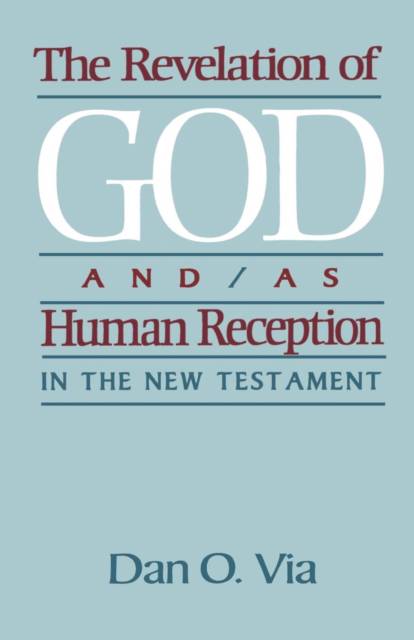
- Retrait gratuit dans votre magasin Club
- 7.000.000 titres dans notre catalogue
- Payer en toute sécurité
- Toujours un magasin près de chez vous
- Retrait gratuit dans votre magasin Club
- 7.000.0000 titres dans notre catalogue
- Payer en toute sécurité
- Toujours un magasin près de chez vous
88,45 €
+ 176 points
Description
Where does God's revelation reside, in the event or in the interpretation? If history is about the creation of meaning, what does it mean to say that God reveals God's self in history? Those who take seriously scripture as revelatory must wrestle with such fundamental questions and their far-reaching implications. Dan Via addresses these and related issues in this original volume.
The title of the book, particularly the "and/as," demands exposition. To speak of God's revelation and human reception is to suggest that God's self-disclosure is something other than and prior to the human response that it elicits. To speak of God's self-manifestation as human reception is to suggest that revelation does not occur apart from the specific ways in which it is received by human beings and that human response is in fact, a positive and constitutive factor in the actualization of revelation. In brief, then, this book is a study of what several New Testament writers understand by the revelation of God to humankind, including both the "and" and the "as."
An opening chapter sketches in a selective way a provisional definition of revelation that embraces a horizon reaching back into neo-orthodoxy while also coming close to the present. Then follow chapters on the word as content and the elusive historical element, including the place of the historical Jesus in revelation; a discussion of Paul based on 2 Cor. 2:14-4:15, with special reference to the four elements of the revelation situation; the use of the historical setting of Mark as a constituent of actualized revelation for all four Gospels followed by similar chapters on Mathew and John. A concluding chapter redescribes the four constituent elements of the revelation situation and relects on some of their interrelationships. Here, then, is a resourceful and thorough study of an important issue in New Testament and systematic theology, and one that takes human action and reception into full account.
Dan O. Via is Emeritus Professor of New Testament as Duke University Divinity School and author of Self-Deception and Wholeness in Paul and Matthew.
The title of the book, particularly the "and/as," demands exposition. To speak of God's revelation and human reception is to suggest that God's self-disclosure is something other than and prior to the human response that it elicits. To speak of God's self-manifestation as human reception is to suggest that revelation does not occur apart from the specific ways in which it is received by human beings and that human response is in fact, a positive and constitutive factor in the actualization of revelation. In brief, then, this book is a study of what several New Testament writers understand by the revelation of God to humankind, including both the "and" and the "as."
An opening chapter sketches in a selective way a provisional definition of revelation that embraces a horizon reaching back into neo-orthodoxy while also coming close to the present. Then follow chapters on the word as content and the elusive historical element, including the place of the historical Jesus in revelation; a discussion of Paul based on 2 Cor. 2:14-4:15, with special reference to the four elements of the revelation situation; the use of the historical setting of Mark as a constituent of actualized revelation for all four Gospels followed by similar chapters on Mathew and John. A concluding chapter redescribes the four constituent elements of the revelation situation and relects on some of their interrelationships. Here, then, is a resourceful and thorough study of an important issue in New Testament and systematic theology, and one that takes human action and reception into full account.
Dan O. Via is Emeritus Professor of New Testament as Duke University Divinity School and author of Self-Deception and Wholeness in Paul and Matthew.
Spécifications
Parties prenantes
- Auteur(s) :
- Editeur:
Contenu
- Nombre de pages :
- 256
- Langue:
- Anglais
Caractéristiques
- EAN:
- 9781563381980
- Date de parution :
- 01-10-97
- Format:
- Livre broché
- Format numérique:
- Trade paperback (VS)
- Dimensions :
- 138 mm x 216 mm
- Poids :
- 335 g

Les avis
Nous publions uniquement les avis qui respectent les conditions requises. Consultez nos conditions pour les avis.






